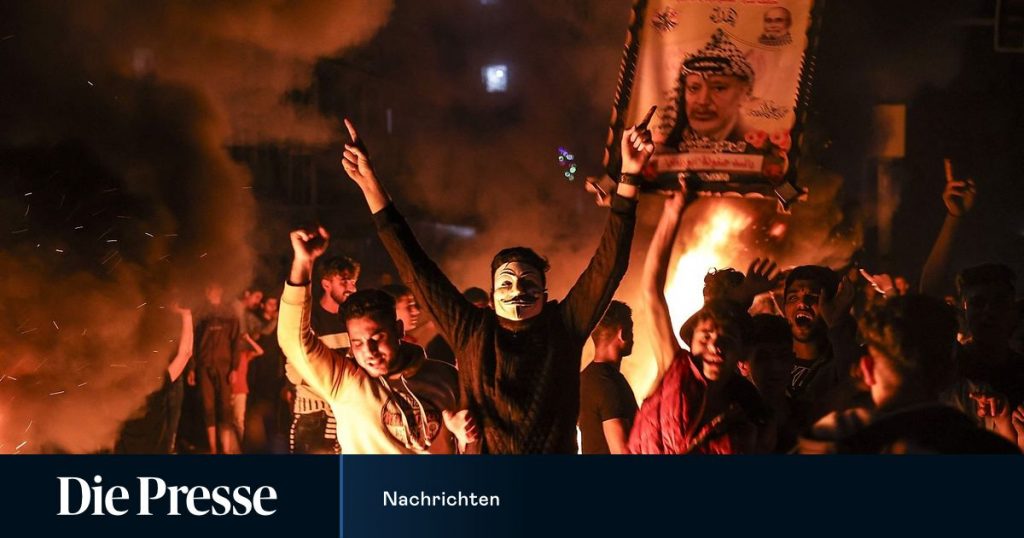In the past few days, Israelis and Palestinians have clashed frequently in the city. During Ramadan, the situation in the Old City and its immediate surroundings is particularly tense.
in Jerusalem The situation remains tense, despite Israeli Prime Minister Benjamin Netanyahu’s call for calm: In the Old City, violent clashes erupted between Palestinians and Israeli police officers on Saturday evening for the third consecutive day, which, according to the Red Crescent Organization, resulted in the injury of six Palestinians. Given the missile strikes from Gaza, Netanyahu warned that Israel “is prepared for any scenario.”
In the past few days, tensions between Palestinian Muslims and Jewish Israelis have been fueled by a series of videos. Show how young Arabs attack ultra-Orthodox Jews and how extremists harass Arab Jews in the streets at night. The far-right Jewish organization Lahava organized a march on Thursday evening in Jerusalem.
More than 120 people were injured in clashes between supporters of Lahava and angry Palestinians on Thursday. More riots followed on Friday evening.
Fears of renewed escalation
The violence has sparked international fears that the conflict between Israel and the Palestinians may escalate again. A spokesman for the US State Department warned that “the speech of extremist demonstrators who chanted hateful and violent slogans” should be “categorically rejected.” The European Union and the United Nations have also expressed their concern.
To prevent new violent clashes, hundreds of Israeli police officers were deployed Saturday night in East Jerusalem, on the border with the Old City. There were lighter arguments at the Damascus Gate, one of the main entrances to the Temple Mount, with the Al-Aqsa Mosque.
According to an AFP correspondent, Palestinians threw water bottles at the police, and then the police used stun grenades. Palestinian youths also set fire to a number of garbage trucks on a nearby street. According to the police, around 100 Palestinians threw stones and Molotov cocktails at the Kalandika border crossing between Jerusalem and the Israeli-occupied West Bank.
The military wing of the Islamic Resistance Movement (Hamas) in the Gaza Strip assured Palestinians in East Jerusalem of its support on Thursday. Friday evening, 36 rockets were dropped on Israel from the Gaza Strip – according to the IDF, it was the heaviest bombing since the start of the year. According to the report, some of the projectiles were intercepted by the “Iron Dome” anti-missile defense system, and more of them fell in the open.
In response to the massive rocket fire, Israeli warplanes attacked Hamas targets in the Gaza Strip on Saturday. On Saturday evening, the Israeli army reportedly intercepted a missile fired at Israel from the Gaza Strip.
Crisis meeting on Saturday
On Saturday, the Israeli government met for a crisis meeting due to escalating violence. Then Prime Minister Netanyahu called on “all parties” to calm down. Observe law and order. Netanyahu emphasized that his government supports “freedom of religion for all residents and visitors of Jerusalem.” Jerusalem Mayor Moshe Lion said in a radio interview that he is holding talks with Palestinian officials in East Jerusalem “to end this stupid violence.” Try to block the Lahava rally on Thursday.
Army Commander Aviv Kohavi also participated in the Jerusalem crisis meeting. Netanyahu said: “With regard to the Gaza Strip, I have given instructions that we must be prepared for all scenarios.” Defense Minister Benny Gantz also stated that the army is ready for a “possible escalation.”
(APA / DPA)

“Food practitioner. Bacon guru. Infuriatingly humble zombie enthusiast. Total student.”








More Stories
Kyiv: Russian Kursk offensive halted
US Presidential Election: Former US Government Officials Warn Against Donald Trump's Election
Netherlands wants to leave asylum system